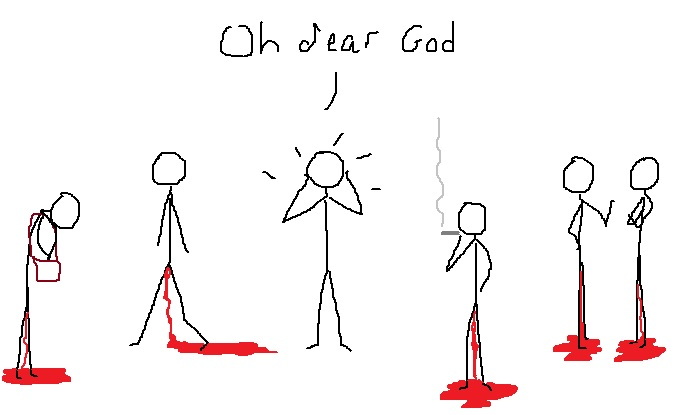When I was a teenager, I had a few close female friends who weren’t shy about sharing when they were on their period. Some also trusted me with some basic information, like when they had cramps, or left home without a tampon and had to shove a wad of toilet paper between their legs. At home, my mother had a heavy menstrual flow, so a regular washing of blood off sheets was nothing out of the ordinary. But for the most part, as a teen-aged boy, I didn’t much reason for me to think about periods. Periods didn’t really effect my life.
The women around me didn’t complain much (to me), so they became a barometer of what a period should be like. Besides, it was mostly out of sight and out of mind. When I heard of girls missing school or work, it just sounded like an excuse. If they weren’t tough enough, then I had no sympathy. At times, I heard other girls make comments about the ones who suffered – as if they were just “looking for attention.”
The short and long of it is: I knew enough to think I knew something, but not enough to know anything about periods.
I started my life very young. I know, we all technically start at the same age, but at the age of 17, I entered a committed relationship that would last the next two decades of my life. When I had just turned 20, I started changing diapers, and in my early 30s, my oldest daughter got her period. So, I needed to know about these things. I mean, I had three daughters by the time I was twenty-two!
My greatest pride in life is in being a father. I was determined to learn enough about the experiences of girls and woman so that my daughters would feel comfortable talking with me about things that were usually the domain of the mother. I had no sons and I wasn’t going to let that be an excuse to have any artificially-induced barriers between me and my children. Of course, I would never know first hand, but I could try and learn.
Furthermore, I’m very fortunate that the mother of my children was very much into rejecting the narrative that blood is gross. As we were together when I was still a teenager, I had to get even more comfortable with period blood. She was not going to hide it or be ashamed. And she made sure that I was “man enough” to be as mature about blood as she was.

We have this tendency to look at others problems, issues or challenges as “not my problem.” Menstruation is one of those things for us men: “not my problem.” We have been brought up in a culture where menstruation something we don’t talk about. In fact, we downright avoid it. In some parts of the world, when a woman is bleeding, she is considered dirty and must be isolated.
As men, when we bleed it’s a sign of strength, manliness, and pride. Why not for women when it comes from their vaginas? As journalist Candida Moss points out in her Daily Beast article , menophobia (fear of menstrual blood) is, well, as old as the Bible.
When I think of what a woman’s body goes through every month, I’m amazed. It’s kinda crazy. Blood flow rips the uterine wall lining to make room for next month’s cycle and a fresh egg. When my body does it’s part in the reproductive cycle, I get to come. A woman: rips her uterine wall with blood to make room for a new egg. Bless the women who were lucky enough to have the genes that makes that tolerable. But really bless the women who weren’t that fortunate. I certainly don’t want any lining of any part of my body ripped off by blood and ejected out of any hole in my body.

Time for us men to recognize women for the badasses they are for taking it “like a woman” when they let flow all that blood from their vagina.
I dated a woman who started bleeding while we were in bed. She was mortified. I was not. I was the father of four daughters (and the tampon/pad bills to prove it). I had lived in a hippy haven in my youth. I was calm and unfazed. And when it happened a second time, her reaction was very different. My ability to act like a grown up gave her permission to feel no shame around it. She had all these cultural patterns telling her that it was gross and something to be ashamed of. I was shocked to find out just how pervasive that is.
Here in Kenya, when I buy menstrual products for my partner, they usually wrap them in paper to hide what’s inside. I’ve learned that girls here lose out on school, often because of lack of access to sanitary products. This is true for 1 in 5 girls in America, too!! This affects us all.
Once, when I woke up with Cera and there was blood on the sheets, I pulled off the sheets and cleaned them. We had somewhere to go and I didn’t have to clean my panties or was blood off my body. It just made sense practically for me to clean it. But she thanked me with real surprise. And her surprise, in turn, took me off guard. As a woman in her 30s, no one had ever done that for her – and why would they? It’s her period, after all. We don’t talk about it – we don’t want to see it. She’s supposed to just ‘deal with it’ as quickly and quietly as possible.
I don’t have to deal with pads, tampons, blood on my panties, pain, or painkillers every month. Cleaning those sheets was the easy part.
I don’t know what I can do in this arena except to listen, to support, and to get over my own discomfort with talking about blood, vaginas and periods. And talk to you men about it. In the documentary film, “Menstrual Man,” Arunachalam Muruganantham figured out what he could do as a man.
Can you imagine the horror of sitting in a classroom with peers and realize you’ve bled from your privates all over your pants and chair? It would be mortifying. And can you imagine what a world would be like if no girl ever had to feel that way because we had all dealt with our ignorance and our fear of menstrual blood?
It’s time we men stop ignoring it, pretending it’s not there, or even finding it gross. In fact, it’s time for us to engage, to learn about this event that made our birth possible and the births of our children.
The same culture that that made #metoo a thing, gives us the world view that periods are gross – that vagina blood is something we never want to see and we don’t want to talk about (but we do want back in that pussy as soon as it’s done doing the gross thing it does every month).
Menstruation is a part of our lives. If you were born, it affected you. If you put your penis in a vagina, it affects you. If your mothers, sister, daughter, partner deals with it for 4-7 days per month, it’s affecting you, whether we recognize it or not. If one girl’s educational future is compromised, it affects us all. And acknowledging it is a huge part of understanding. If it’s true that knowledge is power, then we’re missing out big time! Something that affects women 15-25% of their lives from puberty to menopause is a HUGE thing in the world – and it’s time we know more about it.